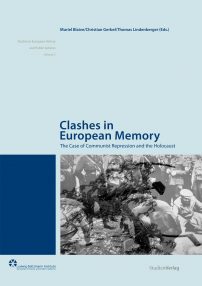Clashes in European Memory
The Case of Communist Repression and the HolocaustIn this volume the conflicted memories of Communist repression and the Holocaust in Austria, Bulgaria, the Czech Republic, France, Germany, Hungary, Poland, Russia, Sweden, Switzerland, and former Yugoslavia are discussed between the poles of politics of history and communicative memories.
The results contribute to a deeper understanding of the memory clashes in different national arenas. The comparative approach also allows the identification of transnational
memory patterns.
Finally, the country specific case studies are completed by a theoretical section, in which historians and cultural scientists reflect on contradictory aspects concerning memory, historiography, and historical learning in contemporary Europe.
AutorInnen:
Muriel Blaive
Christian Gerbel
Thomas Lindenberger
Sie sehen gerade einen Platzhalterinhalt von Vimeo. Um auf den eigentlichen Inhalt zuzugreifen, klicken Sie auf die Schaltfläche unten. Bitte beachten Sie, dass dabei Daten an Drittanbieter weitergegeben werden.
Mehr InformationenSie sehen gerade einen Platzhalterinhalt von YouTube. Um auf den eigentlichen Inhalt zuzugreifen, klicken Sie auf die Schaltfläche unten. Bitte beachten Sie, dass dabei Daten an Drittanbieter weitergegeben werden.
Mehr InformationenSie müssen den Inhalt von reCAPTCHA laden, um das Formular abzuschicken. Bitte beachten Sie, dass dabei Daten mit Drittanbietern ausgetauscht werden.
Mehr InformationenSie sehen gerade einen Platzhalterinhalt von Facebook. Um auf den eigentlichen Inhalt zuzugreifen, klicken Sie auf die Schaltfläche unten. Bitte beachten Sie, dass dabei Daten an Drittanbieter weitergegeben werden.
Mehr InformationenSie sehen gerade einen Platzhalterinhalt von Instagram. Um auf den eigentlichen Inhalt zuzugreifen, klicken Sie auf die Schaltfläche unten. Bitte beachten Sie, dass dabei Daten an Drittanbieter weitergegeben werden.
Mehr InformationenSie sehen gerade einen Platzhalterinhalt von X. Um auf den eigentlichen Inhalt zuzugreifen, klicken Sie auf die Schaltfläche unten. Bitte beachten Sie, dass dabei Daten an Drittanbieter weitergegeben werden.
Mehr Informationen

